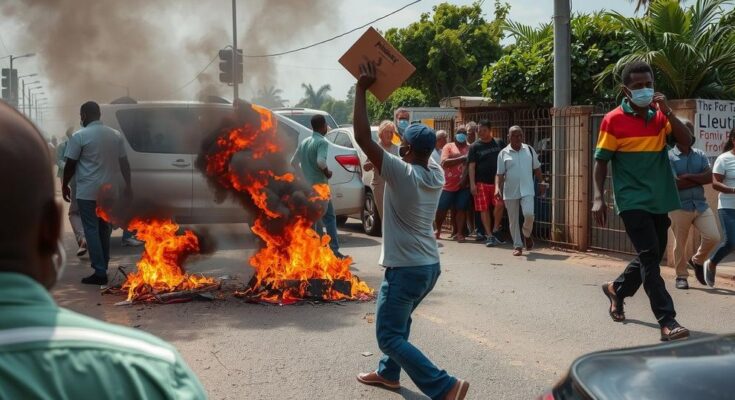Violent protests in Mozambique following disputed election results have led to the deaths of at least 21 individuals, including police officers. The Supreme Court confirmed Frelimo’s victory, which has incited widespread unrest and allegations of electoral fraud. With over 100 deaths since the elections, opposition leader Venâncio Mondlane is calling for accountability and has garnered significant public support amidst the turmoil.
In Mozambique, escalating violence has resulted in the deaths of at least 21 individuals, including two police officers, following contentious electoral outcomes. The conflict erupted after the Supreme Court upheld the ruling Frelimo party’s victory in the October 9 presidential elections, which have spurred weeks of unrest across the nation. Interior Minister Pascoal Ronda reported 236 incidents of serious violence, with 25 casualties, including numerous police officers.
The capital, Maputo, experienced intense confrontations between protesters and law enforcement, prompting police patrols and reported disruptions in daily life. Makeshift barricades led to significant traffic blockages, and essential services such as public transport faced severe interruptions during what is typically a bustling pre-Christmas period. Amidst these tensions, local medical facilities struggled to manage the influx of injured individuals.
Violence has also permeated various regions in northern Mozambique, where opposition support prevails, resulting in over 100 recorded fatalities since the election. Exiled opposition leader, Venâncio Mondlane, alleged election fraud, steepening concerns of ongoing violence and unrest. Mondlane’s supporters are demanding transparency and have called for vigorous resistance against the confirmed outcomes, highlighting their continuous call for “electoral truth.”
President-elect Daniel Chapo, who is set to take office in January, expressed a desire for dialogue with all factions, contrasting sharply with the opposition’s vehement denunciations of the electoral process and its perceived injustices. The situation remains precarious as the nation grapples with the ramifications of the disputed elections.
The violence in Mozambique follows the recent presidential elections where the longstanding ruling party, Frelimo, was declared victorious despite accusations of election manipulation by opposition leaders. As a country that has experienced political turmoil and unrest in the past, these recent developments underscore the fragility of its political landscape. The conflict is exacerbated by the grievances of the opposition, particularly among their stronghold in the northern provinces, which fuels fears of prolonged instability in the region.
In conclusion, Mozambique faces a critical juncture as post-election violence escalates, resulting in numerous fatalities and extensive civil unrest. The conflict emanates from the controversial validation of election results amid claims of wide-ranging irregularities. With the opposition rallying for accountability and transparency, the nation must navigate these tumultuous waters to restore peace and public trust in the electoral process. The international community and local leaders will need to address the underlying tensions to prevent further escalation.
Original Source: www.lemonde.fr




